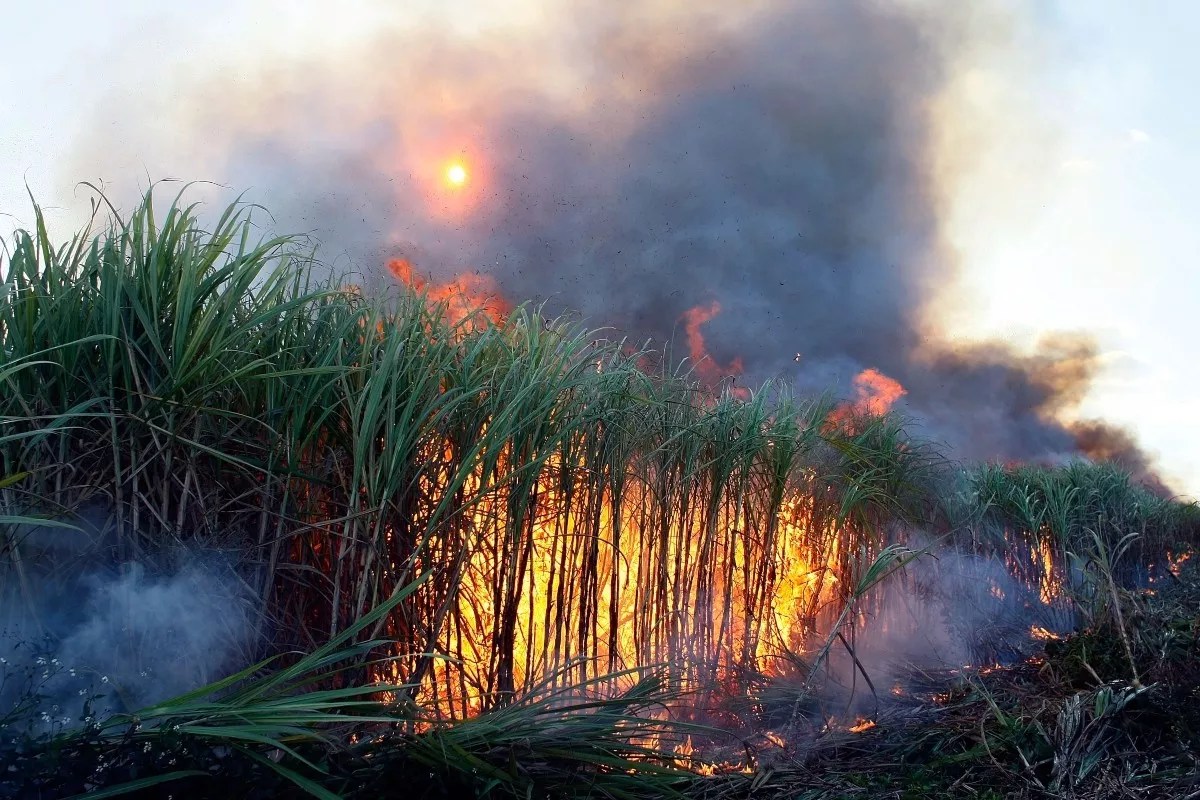

Audio By Carbonatix
Each year, between October and May, farmers set fire to thousands of acres of sugarcane fields south of Lake Okeechobee. The purpose of the blazes: to rid the sugarcane stalks of their outer leaves, rendering them easier to harvest. The practice fills the air with thick smoke that billows into the nearby towns of Belle Glade, Pahokee, and South Bay in western Palm Beach County.
Residents, who are predominately low-income and Black, filed a class-action lawsuit against corporate sugar companies, including U.S. Sugar, the nation’s largest sugar producer, in Miami federal court in 2019. They claimed that the dark ark ash and soot blanketing their homes and cars was not only damaging property but causing respiratory problems and other health issues. In 2020, a joint investigation by Grist and Type Investigations cited a Sierra Club analysis of data from the U.S. Environmental Protection Agency (EPA) showing that 3,000 tons of hazardous pollutants, including a host of carcinogens, are released into the air each year by sugarcane burning in South Florida.
“The sugar producers do know that the burn is causing harm, but when you are a big company, you don’t like to be told what to do,” Robert Mitchell, founder of Belle Glade’s chapter of Black Lives Matter, told New Times in February of 2021. “They burn over this community of three African-American cities. But when the wind blows east to the majority-white communities, they can’t do that.”
But following a three-year court battle, the parties agreed that the case would be dropped with prejudice, with each side paying its own costs and the plaintiffs barred from refiling.
It was a big win for U.S. Sugar, which released a triumphant statement: “The case against air quality in the farming region was without merit. We believed the science, data and regulations that support our work every day would show that the air quality in the Glades is ‘good’ – the highest quality under federal regulations.”
The Berman Law Group, the firm representing the plaintiffs, did not release a statement about the case or respond to New Times‘ emailed requests for comment. Mitchell, who previously spoke to New Times about the sugar industry’s racist environmental practices, did not respond to an email or Facebook message seeking comment.
The dismissal came as a massive disappointment to the environmentalists who have long advocated for an end to the controversial practice. They say the battle against Big Sugar is far from over.
“Sugarcane burning is one of the most egregious environmental injustices in the state of Florida,” Eve Samples, executive director of Friends of the Everglades, tells New Times. “Nothing about this news regarding the lawsuit changes that. In fact, it only makes us more concerned.”
For decades, Florida’s sugarcane farmers have legally set their fields ablaze before harvest as a money-saving practice to rid the stalks of their leaves to more easily reach the canes and ship them without the extra vegetation. Cane growers burned more than 1.5 million acres of sugarcane between 2008 and 2018 in the Glades community alone, according to state data.
Florida’s largest sugar companies have long maintained that the burns are “safe” and heavily regulated. U.S. Sugar and the other companies named in the suit had vigorously denied residents’ claims and argued for the case’s dismissal.
U.S. Sugar began distributing an annual “State of Our Air” report in the communities where the black soot falls. “The Glades communities have some of the best air quality in the state,” the company stated in the report, adding that the air is “clean.”
The sugar industry pointed to the government-run air monitor in Belle Glade that showed the region complied with the Clean Air Act, the federal law that regulates air quality. But a ProPublica investigation discovered that the monitor hadn’t been working correctly since at least 2013 and “wasn’t suited to determine whether the air quality meets the requirements outlined in the federal law.”
Environmentalists argue that crop burning is outdated and unnecessary. For instance, Brazil, the world’s largest sugar-producing country, has successfully eliminated the practice and shifted to green harvesting. India, the world’s second-largest producer, has also banned crop burning.
Sierra Club Florida, which launched the “Stop the Burn!” campaign in 2015, seeks to replace the practice with “modern, sustainable, burn-free green harvesting.” The group released a statement Monday following the lawsuit’s dismissal that signaled the Sierra Club’s continued dedication to its fight against the practice.
“Local Stop the Burn-Go Green activists, none of whom were plaintiffs in the Berman Law Group class action lawsuit, will continue to battle against the outdated, toxic, and racist practice that the sugar industry can and must stop,” the Sierra Club’s statement reads, hinting at the potential for a new lawsuit with different plaintiffs.
Activists have long tried to enlist Florida’s agricultural commissioner Nikki Fried, a Democrat running for governor, as a strong environmental advocate. Despite possessing the authority to ban the practice in Florida, Fried has only made a few minor tweaks to the regulations since 2019, such as outlawing burning at night.
“There’s a lot of blame to go around on this issue,” says Eve Samples of Love the Everglades. “The bottom line is that people are being harmed in blue-collar communities and communities of color in Florida, while our state leaders are protecting billionaire-backed sugarcane companies.”